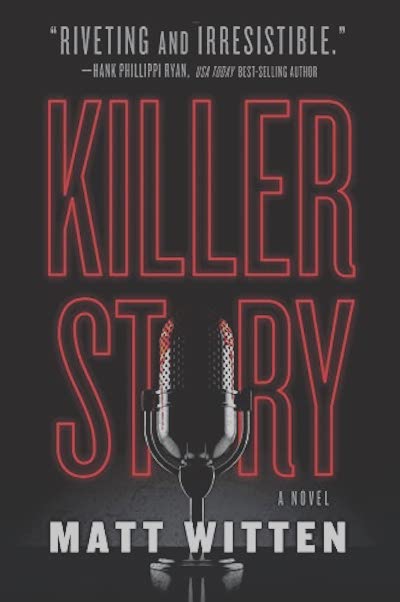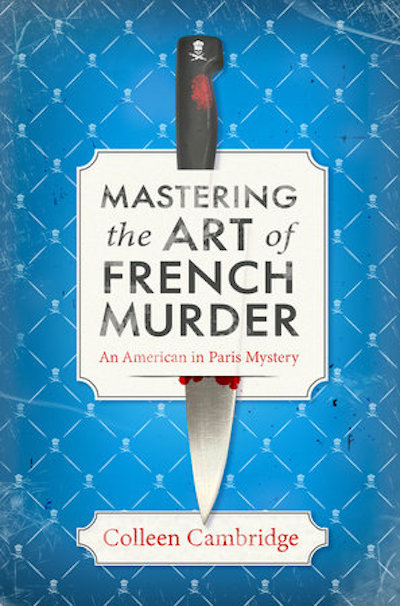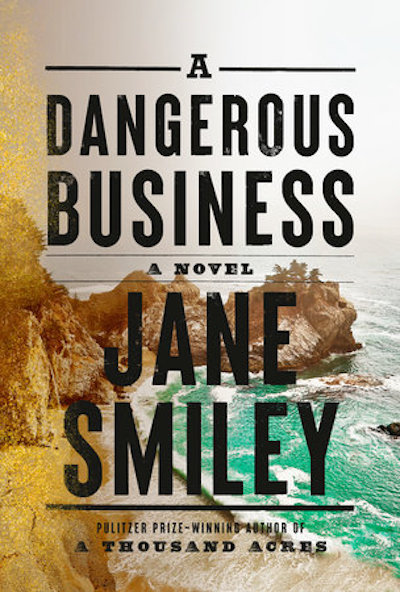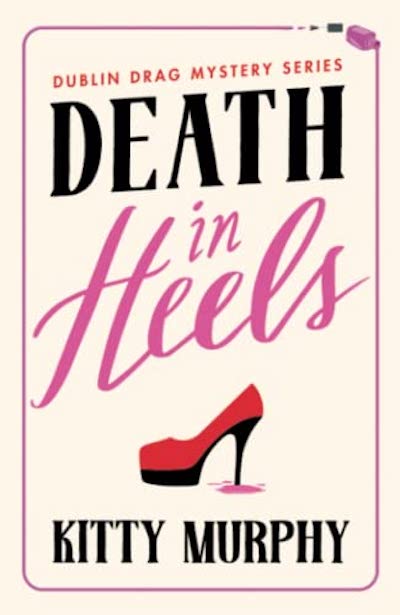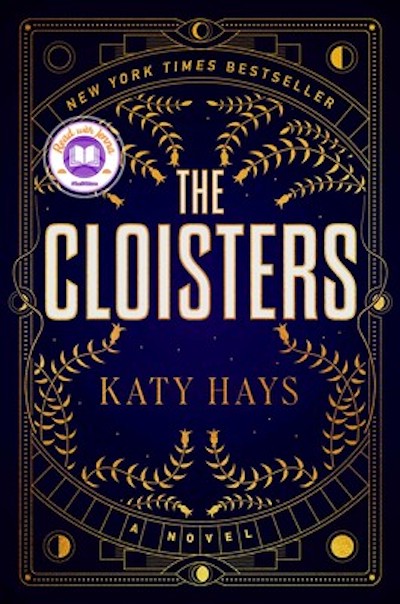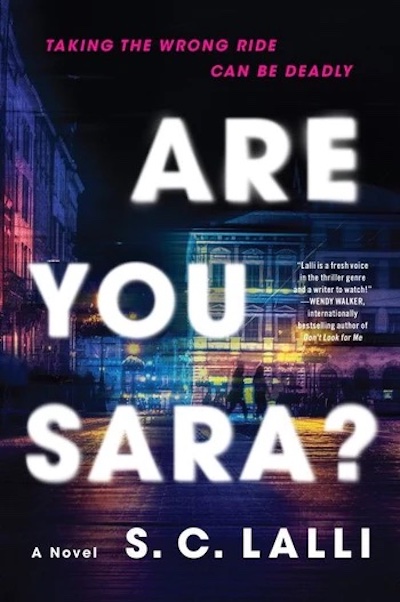A high energy foray into cryptocurrency and government corruption. At the center of the novel is petite, running-suit clad, 75-year-old Ethel Crestwater, a former FBI agent who operates a boarding house in Arlington, VA for law enforcement folk who need a temporary home in the DC area. Never married and with no kids, Ethel starts every morning in her basement with a round of RBG’s exercises. The latest addition to her clan is Jesse, a remote relative, but her only relation, who’s moved to DC for graduate work in computing. When one of “her” agents is gunned down in front of her house, Ethel, assisted by double-first-cousin-twice-removed Jesse, catapults into action. It helps that Ethel knows—and is owed favors by—a range of characters, from the director of the FBI to the Secret Service to the local Arlington detective; part of the fun of the book is watching the territorial struggles among the different agencies. Yes, wise-cracking Ethel is highly entertaining, but to de Castrique’s credit, she’s no cutesy stereotype of a gun-wielding grandma. She’s got her own story, and it’s a complex one. Ethel and sidekick Jesse make a great team; how about Jesse drops out of school and they take up sleuthing full time? Bonus: this book is a helpful primer for the uninitiated on cryptocurrency and how it works. Readers who enjoy this novel will also appreciate Deanna Raybourn’s Killers of a Certain Age.
Brian Kenney
It’s great to have Matt Witten publishing crime fiction again. The author of one of my favorite series, the Jacob Burns mysteries, he returned to crime fiction last year with the riveting thriller The Necklace. Killer Story is in the thriller vein, and like The Necklace it provides the reader with plenty to dwell on instead of just rushing to the end—not that there’s anything wrong with that. Petra Kovach is a bright young journalist in a contracting industry. No sooner does she land a job than a year later she’s out the door, a victim of downsizing. It’s happening again, this time at the “Boston Clarion,” and to bide two more weeks she pitches her boss a true-crime podcast that would reopen the violent murder of super right-wing Olivia, a Harvard undergrad—and YouTuber—who had an enormous following. For Petra, this is personal. She was Olivia’s counselor at summer camp, and the two remained tight ever since, despite their political differences. But as Petra tracks down possible murderers, and as her audience grows by the thousands then the millions, she sheds first any journalistic ethics, then any ethics at all. Witten sustains the suspense, with the narrative just leaping ahead, chapter by chapter, while at the same time most readers will be wondering: does the end justify the means? And how far can Petra go? Perfect for fans of Dervla McTiernan and Hank Phillippi Ryan.
Cambridge’s newest series has everything going for it. A magical setting: Paris awakening after World War II, with its fabled lights returning and food overflowing in the marketplaces. A great lead: sophisticated Tabitha Knight, who’s abandoned Detroit, and a dull fiancé, to live with her older French uncle and his longtime partner. Plus some star power: Tabitha’s buddy and neighbor, the young Julia Child, a student at Le Cordon Bleu who can always be found in her kitchen, stuffing some poor bird. Cambridge does a brilliant job capturing Julia with her quirky diction, fluty enunciation, and joie de vivre. But some of that joie flies out the window when a young woman is found dead in Julia’s basement; the murder weapon is a knife from Julia’s kitchen; and a note, in Tabitha’s handwriting, is found on the woman’s person. Tabitha—every bit the modern, independent woman—heads off to track down leads, break into the victim’s apartment, and befriend an American theater group, all the while drawing the ire—and maybe admiration?—of the taciturn, but so very handsome, Inspector Merveille. A first-rate traditional mystery with strong characterization that is certain to appeal to a broad readership, especially fans of Jacqueline Winspear, Rhys Bowen, and Cambridge’s own Phyllida Bright series.
Murder at the wedding of one of Sri Lanka’s one percent? I initially imagined this to be a cozy affair, with lots of chatter about couture, gossip about affairs, and the body of one of the bridesmaids—the one no one likes—being discovered in the shrubbery, poisoned. Boy, I couldn’t have been more wrong. Yes, no extravagance is spared or undocumented—Vuitton is the bag of choice—but this crime novel is far darker, far more terrifying than I had ever imagined. It’s super-perfect Kaavi’s wedding—she of the billionaire family, the foundation devoted to girl empowerment, the perfect blow-out—and she’s invited her former best friend, Amaya, to the wedding. Not only were the two besties all throughout childhood, they were college roommates in the U.S., until an epic falling out involving Amaya’s boyfriend—whom Kaavi is now set to marry. Though they haven’t spoken in five years, Amaya flies to Colombo with one goal: stop the wedding, by any means necessary. Jealous much? Oh, if only it was mere jealousy in this nothing-is-what-it-seems narrative. Perfectly paced, rich in Sri Lankan culture, witty in its descriptions, and well aware of gender and class disparities, Jayatissa’s creation is that rare bird: the perfect thriller. By the author of My Sweet Girl, this book will appeal to fans of Julie Clark, Samantha Downing, and Lucy Clarke.
A struggling photographer, twenty-something Liv Spyer is gifted with the powerful abilities to both observe and remember the world around her, gifts she needs if she ever wants to get out of her grandparent’s Greenwich Village brownstone, where she helps out in their key shop while carving out a tiny photography studio for herself in the basement. Finances are at an all time low—the holidays are approaching—when Liv crosses paths with Regina Montague, a prominent events photographer. After a little coercion, Liv convinces Regina to hire her and before you know it, she’s helping to photograph the social event of the season: the Holiday Debutante Ball. This is Liv’s big chance, until socially prominent Charlie Archibald interrupts the evening by being found dead in a pool of his blood, killed by a knife through an eyeball (yikes!). It doesn’t take much for Liv to decide to take on the case, and it’s a delight to follow her over Manhattan as she tries to piece together the puzzle, trusted camera in hand. While the plot can get super complicated, Brecher has done some great world building here—from Liv’s warm and loving Italian family to a possible boyfriend who may be an FBI agent—creating a world we’d be all too happy to return to again.
Few know that one of Jane Smiley’s earliest works, published in 1984, was a mystery called Duplicate Keys set in contemporary Manhattan. Here, Smiley returns to crime fiction, although now we are in a completely different locale: Monterey in the mid-19th century. Eliza Ripple moves from Kalamazoo to Monterey with her husband, who promptly gets killed in a bar fight, leaving her broke and unemployed—but hardly sad at her piggish husband’s demise. Days later she’s recruited by Mrs. Parks to join her brothel, and with no other resources, agrees. Mrs. Park runs a tight ship: the women see only one or two clients a day; have physical protection, in the form of a bouncer; and are able to ban men they deem risky. Throughout the book, it’s women who keep each other safe, whether through friendships or the environments they create. And for the first time in her life, Eliza has financial security. All is as well as can be expected until Eliza realizes that young women in Monterey are disappearing, and discovers their bodies in a creek outside of town. She pairs up with her buddy Jean, also a sex worker and quite likely a lesbian—she’s got a terrific wardrobe of menswear—and the two women use every resource they have, from their clients to Edgar Allen Poe’s stories of detective C. Auguste Dupin, to discover who is murdering the women of Monterey. Smiley takes time to describe the wild west and the magical beauty that surrounds her characters. But ever present is the vulnerability that women face and the need to take matters into their own hands.
Most of us are familiar with the kidnapping of Charles and Anne Morrow Lindbergh’s baby, Charlie, in 1932, which was known as “the crime of the century.” So what can a fictionalized version of the events offer readers today? A whole lot more, it turns out. Fredericks has Betty Gow, the baby’s nanny, narrate this tale, which begins with Betty’s arrival in Detroit from Scotland—in pursuit of love gone wrong—and ends several years later with her permanent return to Glasgow. Kudos to Fredericks for creating in Gow such a hugely compelling character: smart, introspective, full of humor, a loving nanny. She’s also a terrific social observer, watchful of class distinctions, and all too aware of the inequality of the sexes. The first third or so of the book builds towards the abduction of Charlie—it’s incredibly nerve racking—while the middle third is centered on the messy aftermath of the crime: the frenzied press, the myriad ransom notes, the continual interrogations by detectives. In the final third, the narrative builds again as Betty returns from Scotland to testify in the trial of Bruno Hauptmann, who was eventually convicted and electrocuted, and the courtroom drama that unfolds is nothing less than brilliant. As fans of the Jane Prescott mysteries can testify, Fredericks is especially adept at historical settings, and this book doesn’t disappoint. The Lindbergh Nanny can cross-over in all kinds of directions, and should appeal to readers of crime fiction, historical fiction, women’s fiction and those just needing a solid read. Librarians: watch the holds list on this one.
Irish drag queens may not get much sunlight, but they can still throw plenty of shade. Centered on a drag family that performs at the Dublin dive bar TRASH, the novel follows Fiona (Fi) McKinnery and her best friend and roommate Robyn/Mae B as Mae B makes her debut on the TRASH stage, lip-syncing to Julie London. She’s a huge success, until Eve, a nasty little queen, does a parody of Mae B’s act, ruining the night. When, later that evening, Eve is found dead, face down in an overflowing gutter, is anyone surprised? While everyone, from the gay community to the Gardaí (police), is willing to accept the death as an accident, Fi—who discovered the body on her way home from the club—is convinced it’s murder. When she speculates about Eve’s murder on her blog, she draws the ire of the queens who would rather forget about the whole thing and quickly turn their misogyny on Fi, dubbing her “Hagatha Christie.” Unfortunately, ensuing incidents only support Fi’s speculation. A charming novel about growing up and growing apart, the power of family—both your own and the one you create—and the danger of repression.
A wonderfully dark novel rich in characterization. After Ann Stillwell graduates from college, she doesn’t waste a minute more in Walla Walla, WA, and heads to New York City’s Metropolitan Museum of Art (Met), where she has secured a summer position as curatorial associate. But there’s a mix up, and Ann ends up at the Cloisters, the Met’s museum and garden devoted to medieval art, located at the remote northern tip of Manhattan. Here she ends up working with Rachel Mondray, who is everything Ann isn’t: Yale educated, Harvard bound, immensely wealthy. Will they be friends, enemies, or frenemies? Friends, it turns out, providing they stick to Rachel’s terms. Under the tutelage of Patrick, the curator-in-charge, they research early Renaissance tarot cards in preparation for an upcoming exhibit. But the cards aren’t just visually beguiling. They are powerful in ways that go well beyond art history, capable of inspiring evil today. Hays does a wonderful job of opening up the lives of both Ann and Rachel, who forge an alliance—like the contestants in a Survivor-like TV show—that will see them safely through the summer. Or will it? Fans of Shapiro’s The Art Forger, Perez-Reverte’s The Flanders Panel and Santlofer’s The Last Mona Lisa will love this book.
A complex tale centered around law student Saraswati “Sara” Bhaduri, who’s struggling financially to put herself through law school. One of her side gigs is bartending at a dive bar, which is how she meets up with Sarah Ellis, who’s passed out in the women’s room one closing time. Oddly, they hit it off as they wait for their Ubers, which arrive at the same time. Sara jumps in and in seconds is asleep—only to wake up miles from home in the rich part of town. There’s only one explanation: they mixed up their cars. When she makes it home, it’s to find her building a crime scene and Sarah dead. Is Sara in some way responsible? Sara’s guilt may seem odd at first, but as the novel expands—and we learn more about her life—the pieces start to fall into place. It’s fun to see Sara take even greater charge of her life as she fights to learn what happened to Sarah and what might be her own fate. A fresh and powerful new voice, this is a crime writer to watch.


